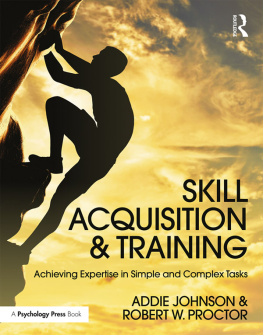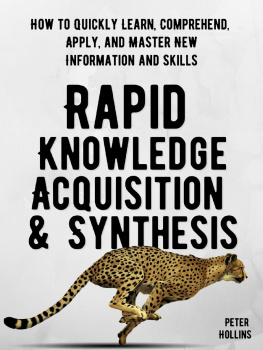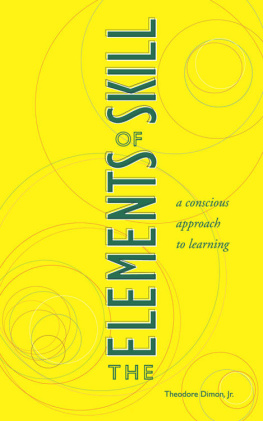Skill Acquisition and Training
Skill Acquisition and Training: Achieving Expertise in Simple and Complex Tasks describes the building blocks of cognitive, motor, and teamwork skills, and the factors to take into account in training them. The basic processes of perception, cognition, and action that provide the foundation for understanding skilled performance are discussed in the context of complex task requirements, individual differences, and extreme environmental demands. The role of attention in perceiving, selecting, and becoming aware of information, in learning new information, and in performance is described in the context of specific skills.
A theme throughout this book is that much learning is implicit; the types of knowledge and relations that can profitably be learned implicitly and the conditions under which this learning benefits performance are discussed. The question of whether skill acquisition in cognitive domains shares underlying mechanisms with the acquisition of perceptual and motor skills is also addressed with a view to identifying commonalities that allow for widely applicable, general theories of skill acquisition. Because the complexity of real-world environments puts demands on the individual to adapt to new circumstances, the question of how skills research can be applied to organizational training contexts is an important one. To address this, this book dedicates much of its content to practical applications, covering such issues as how training needs can be captured with task and job analyses, and how to maximize training transfer by taking trainee self-efficacy and goal orientation into account.
This comprehensive yet readable textbook is optimized for students of cognitive psychology looking to understand the intricacies of skill acquisition, while being accessible to a range of students and practitioners.
Addie Johnson is Professor of Human Performance and Ergonomics at the University of Groningen. She is co-author, with Robert Proctor, of Attention: Theory and Practice, and Neuroergonomics: A Cognitive Neuroscience Approach to Human Factors and Ergonomics. Her research focuses on the intersection of memory and attention.
Robert W. Proctor is Distinguished Professor of Psychological Sciences at Purdue University. In addition to the books with Addie Johnson, he is co-author, with Trisha Van Zandt, of Human Factors in Simple and Complex Systems (2nd ed.) and, with Kim-Phuong L. Vu, of Stimulus-Response Compatibility Principles: Data, Theory, and Application. His research focuses on basic and applied aspects of human performance.
Skill Acquisition and Training
Achieving Expertise in Simple and Complex Tasks
Addie Johnson and Robert W. Proctor

First published 2017
by Routledge
711 Third Avenue, New York, NY 10017
and by Routledge
2 Park Square, Milton Park, Abingdon, Oxon, OX14 4RN
Routledge is an imprint of the Taylor & Francis Group, an informa business
2017 Taylor & Francis
The right of Addie Johnson and Robert W. Proctor to be identified as authors of this work has been asserted by them in accordance with sections 77 and 78 of the Copyright, Designs and Patents Act 1988.
All rights reserved. No part of this book may be reprinted or reproduced or utilised in any form or by any electronic, mechanical, or other means, now known or hereafter invented, including photocopying and recording, or in any information storage or retrieval system, without permission in writing from the publishers.
Trademark notice: Product or corporate names may be trademarks or registered trademarks, and are used only for identification and explanation without intent to infringe.
Library of Congress Cataloging-in-Publication Data
Names: Johnson, Addie, author. | Proctor, Robert W., author.
Title: Skill acquisition and training / by Addie Johnson and Robert W. Proctor.
Description: 1st Edition. | New York : Routledge, 2016. | Includes bibliographical references and index.
Identifiers: LCCN 2016008665 | ISBN 9781138640153 (hb : alk. paper) | ISBN 9781138640160 (pb : alk. paper) | ISBN 9781315531656 (e)
Subjects: LCSH: Ability. | Attention. | Cognitive learning.
Classification: LCC BF431 .J594 2016 | DDC 153.9dc23
LC record available at https://lccn.loc.gov/2016008665
ISBN: 978-1-138-64015-3 (hbk)
ISBN: 978-1-138-64016-0 (pbk)
ISBN: 978-1-315-53165-6 (ebk)
Typeset in Palatino
by Apex CoVantage, LLC
Contents
Skilled behavior is fundamental to all human activities. Skills such as driving, reading, and typing are so common that we sometimes take them for granted. However, most skills are a marvel of coordination. The same basic processes of perception, cognition, and action that underlie basic skills go into the development and performance of more specialized skills, such as electronic troubleshooting, operating heavy machinery, playing tennis, and managing an organization. The way in which skill is acquired and maintained, as well as the factors that affect skilled performance, is of major concern to individuals, educators, professional trainers, and human resource specialists in industry. Training programs are devised that are intended to maximize acquisition, retention, and transfer of the acquired skills to the situations in which they must be executed. These programs must take into account how people learn, but also their motivation to learn and organizational barriers to change. The goal of the present text is to describe the basic components of skilled performance and the way that these components can be integrated through practice and training to produce the high-level skill required in various aspects of life.
Historically, a primary focus of skills research has been on perceptual-motor performance. This research, both basic and applied, has produced a better understanding of such issues as the way in which actions are selected and coordinated, levels of skilled performance, and the conditions of practice and training that facilitate the acquisition and transfer of skill. Over the years, however, skills research has expanded to encompass higher-level cognitive skills, such as those involved in expert problem solving and decision making. This expanding research base, coupled with the development of sophisticated methods for modeling performance, has resulted in major advances in the investigation and understanding of skill. It is our intent to present these advances in a unified way that provides researchers, designers, and managers with the knowledge they need to evaluate new research and assess and develop training programs and selection criteria.
Basic processes of perception, cognition, and action provide the foundation for understanding skilled performance, but an understanding of complex skills requires an integrative, interdisciplinary view of human performance. Thus, in addition to reviewing skills research in the perceptual, cognitive, and motor domains, we consider individual differences in basic cognitive abilities and goal orientation and the limitations they place on what can be learned or performed, as well the influence of situational factors on the learning and expression of skills. Where appropriate, we use models of skilled performance and skill acquisition within the various domains of skill, as well as real-life examples, to frame research findings. Importantly, we do not simply describe skilled performance; we also discuss how to achieve it. Chapters on training and instruction describe in detail how basic research can be applied to practical problems.












